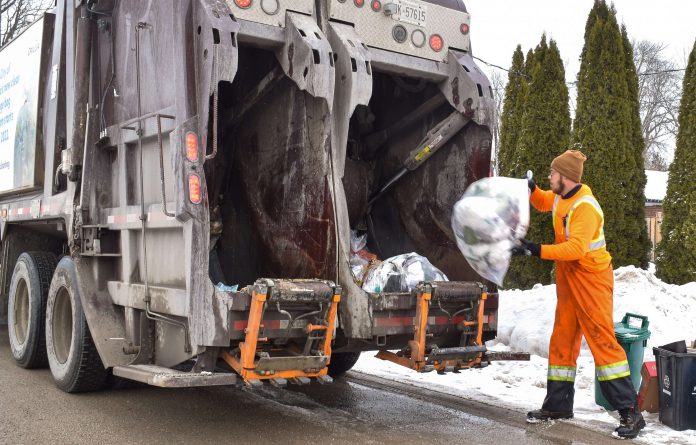
The City of Orillia would like to thank residents and businesses for their participation in the new clear garbage bag program.
The program took effect on Monday, Feb. 7, 2022, requiring garbage to be set out in a clear plastic bag instead of a black or green plastic bag. It aims to encourage residents to sort recycling and compostable materials appropriately, assists with the removal of hazardous items from the waste stream, and offers increased worker safety by enabling the garbage collectors to see the contents of the bags and avoid hazardous items.
“On behalf of Council and staff, I would like to thank everyone for their efforts to make this program a success. To see a 95 per cent compliance rate in the first week is fantastic,” said Mayor Steve Clarke. “We understand this is a big change for Orillians, but the benefits are clear; after the first week, we are seeing more people composting in Orillia and lower garbage weight overall. These efforts and community support show that we can all work together to divert waste from the landfill and help protect the environment.”
After reviewing the collection data from the first week of the program (Feb. 7 to Feb. 11), 95 per cent of residents participated in the new program by using a clear bag, a rigid container or did not set any garbage out. The weight of garbage collected at the curb decreased by approximately 47 per cent compared to the same collection week in 2021. Additionally, the organics collected last week increased by approximately 56 per cent when compared to the same week last year. Recycling rates remained status quo.
“We are also seeing an increased demand for green bins at the Waste Diversion Site, which is another way we can measure the success of the program. On average, we normally sell or provide about 100 units per month; however, for the month leading up to the program, we saw a demand for the equivalent of approximately 400 units per month,” said Greg Preston, Manager of Environmental Services. “Not only does this increase in organics collection help extend the life of the City’s landfill, but it is also better for the environment overall and is an important climate change action for our community.”
For the first week of the program, City staff and the City’s waste collection contractor provided some flexibility for residents. A reminder notice, sample clear bag and a copy of the waste collection guide were distributed to locations that did not have their garbage set out in a clear bag. Moving forward, collection drivers will leave behind opaque bags or bags that contain a large amount (over 10 per cent) of recycling and compostable material that should go in the recycling or green bins. Soiled recycling that is required to be placed in the garbage (i.e. soiled tinfoil) will still be accepted.
For privacy, residents can place up to two small privacy bags, such as a regular-sized opaque grocery bag or kitchen bag, to hide private items in their clear bag. Residents that do not want to use a clear bag can still place their garbage directly in a rigid container. If residents are lining their rigid container, it must be with a clear bag. Regular collection set out requirements, including the use of garbage tags, remain the same.
For more information on the program, including answers to frequently asked questions and a list of local retailers stocking clear bags, please visit orillia.ca/clearbag or call 705-325-3522. For detailed information related to the City’s solid waste collection program, including material sorting information and set-out requirements, view the Waste Collection Guide or visit orillia.ca/recyclingtips.







